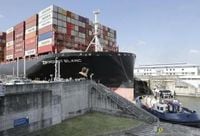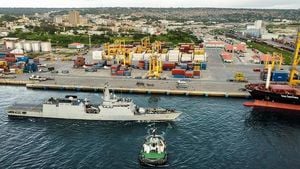In a bold assertion on April 26, 2025, former President Donald Trump took to his social media platform to declare that American ships should be allowed to transit the Panama and Suez Canals free of charge. He emphatically stated, "These canals would not exist without the United States," highlighting his belief in America's pivotal role in the existence and operation of these crucial maritime routes.
Trump's comments sparked immediate interest and concern, as he indicated that he had instructed Secretary of State Marco Rubio to respond to this issue. The former president's remarks came amidst ongoing discussions about the control and management of the Panama Canal, which he has previously claimed is being operated by China. In his inaugural address back in January, Trump made headlines by asserting his intention to regain control over the canal, a point he reiterated in this latest statement.
The Suez Canal, which opened in 1869, serves as a vital link between the Mediterranean Sea and the Red Sea, facilitating maritime traffic between Europe and Asia without the need for ships to navigate around Africa. Spanning approximately 193 kilometers, the canal is one of the world's most significant waterways. Trump's mention of this canal marks the first time he has publicly advocated for free passage for U.S. vessels there, further emphasizing his administration's focus on American interests in global trade routes.
Trump's call for free passage through these canals has raised eyebrows, particularly given the historical context of U.S. involvement in the Panama Canal. The canal was constructed in the early 20th century, with significant American investment and military presence. However, the U.S. relinquished control of the canal to Panama in 1999 under the Torrijos-Carter Treaties. Since then, the management of the canal has been a subject of contention, especially with Trump's previous claims regarding its operation by Chinese interests.
In March, a Hong Kong-based company that operates two ports at either end of the Panama Canal announced plans to sell its operating rights to a joint venture led by a major U.S. asset management firm. This development has been met with resistance from Chinese authorities, suggesting that geopolitical tensions surrounding the canal are still very much alive.
Trump's rhetoric reflects a broader narrative that has characterized his political career: a strong nationalist approach to foreign policy that prioritizes American interests above all else. His insistence on free passage through the Panama and Suez Canals can be seen as part of his strategy to reassert U.S. dominance in international trade and maritime law.
Critics of Trump's stance argue that his approach could escalate tensions with countries that currently control these waterways. The Suez Canal, for instance, is operated by the Suez Canal Authority, an Egyptian state-owned entity, which could view Trump's remarks as a challenge to its sovereignty. Similarly, the Panama Canal Authority, which manages the canal post-U.S. control, may see Trump's comments as a threat to its operations.
Supporters of Trump's position, however, may view this as a necessary assertion of U.S. interests in a world where global trade is increasingly contested. By advocating for free passage, Trump is attempting to rally support among those who feel that American shipping interests have been sidelined in favor of foreign entities.
The implications of Trump's call for free passage extend beyond mere rhetoric. If he were to regain the presidency, the policies he implements regarding these canals could significantly impact international shipping routes and trade agreements. Such a move could also lead to increased military presence in these regions, as he has previously hinted at a willingness to use military force to protect U.S. interests.
As the debate continues, the response from both the U.S. government and international stakeholders will be crucial in shaping the future of these vital maritime corridors. Trump's remarks have reignited discussions about the U.S.'s role in global trade and the extent to which it should intervene in foreign maritime affairs.
In conclusion, Trump's recent statements regarding the Panama and Suez Canals underscore a significant shift in the discourse surrounding U.S. maritime policy. As the world watches closely, the implications of his rhetoric could have far-reaching effects on international relations and trade.





